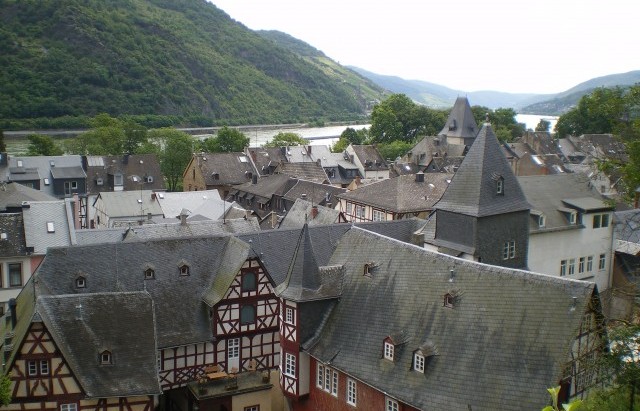
From the moment I settled into my window seat on a plane destined for Frankfurt, it was a vacation riddled with contradictory feelings. My dad’s business trip this past July to Baden-Baden had morphed into a familial “roots trip.” My parents, sister, brother-in-law, and I went to visit the birthplaces of my dad’s side of the family on the Rhine–but also to take in the baths of Baden-Baden, stroll down Berlin’s Unter Den Linden, and shop at the famous KaDeWe department store. We were digging into our Jewish family history. We were remembering the Holocaust, visiting graves. But we were tourists, too, searching for the Germany that was before and that came after–searching for home.
I wanted to hate Germany. I wanted to see nothing of myself in the people whose ancestors forced my grandpa and grandma into exile in 1937 and 1939, respectively, and murdered or enslaved those members of my family who could not get out.
In the bigger city of Bad Kreuznach, my grandpa’s parents recognized the full danger of Hitler’s anti-Semitism from the start and by 1933 were already working to get U.S. visas. My grandma’s family, on the other hand, did not have the same exposure to the Nazis in their small hometown. It took Kristallnacht, the night of coordinated attacks on Jews and Jewish property on November 9, 1938, to convince them they had to escape Germany, but by then visas were hard to come by. As a result, my grandma’s only choice was to leave alone, at the age of nine, on a Kindertransport to Switzerland. Her grandmother–and my namesake–Caroline Nachmann, was sent to the Theresienstadt concentration camp. The Nazis spared her because she could mend and sew their uniforms. Her husband, and many other family members, were not so lucky.
Frankfurt was sleepy and chilly, not at all seductive, and we had few interactions with locals, who looked nothing like me. “I am just Jewish, not German,” I thought. But as we left Frankfurt for the small towns in the Rhineland, where my family once lived, my feelings grew more complicated.
Part of it had to do with the beauty of the landscape. The drive from Frankfurt to Wallertheim, where my Grandma Ann grew up, was all rolling hills, wheat fields, and blooming sunflowers. The town itself was a cluster of quaint stucco houses and cobblestone roads. We located her childhood home and found ourselves imagining what our lives would have been like had she never been forced to flee. My grandparents first met at a bakery in Milwaukee, but, strangely enough, they would probably have met all the same had their families not immigrated to the U.S. Their German hometowns are only about 10 miles apart, and members of their family were already acquainted.
We decided to look for the Jewish cemetery before leaving Wallertheim but couldn’t find it. After a few aimless laps around town, we peeked into a pub by the train station to see if anyone could point us in the right direction. As luck would have it, Wallertheim’s two Lutheran ministers–Klaus and his wife, Marianne–were there, finishing their lunch. Klaus whipped out his cell phone and called up the town mayor, who promptly arranged for the cemetery caretaker to meet us at the pub with a key to the cemetery gate.
Klaus and Marianne joined us for the visit and laid pebbles on the gravestones of our ancestors. They showed us where the town’s synagogue once stood and explained how it had been damaged on Kristallnacht and then finished off by the war. Content with our visit and the history we had gleaned from Klaus and Marianne, we were ready to pile back into our van. But Klaus convinced us to stop by his nearby church first. It housed an organ, originally built in the 1740s, that he wanted to show us.
When we’d ascended the steep stairs to the organ loft, Klaus began to play a song. It was not a traditional Christian hymn but “We Shall Overcome.” As I awkwardly began to swat tears from my eyes, Klaus went on to play “Havenu Shalom Aleichem” and “Shalom Chaverim”–two traditional Jewish songs about peace, love, and friendship. When my mom asked why these Jewish and English songs were included in their hymnal, Marianne answered, “It’s for our peace.”
When I applied to law school last fall, I wrote an essay about having always seen my life through multiple windows–about how growing up half in Chicago and half in a rural town in Wisconsin defined my world outlook. I was three-quarters city slicker, one-quarter cheesehead. But it was my trip to Germany that made me realize I was something else, too. So many of the family characteristics I’d once viewed as Jewish–our obsession with organization and neatness; the goose-down comforters on all our beds; the apple strudel I associate with special occasions; the dark rye bread my dad cannot seem to get enough of; even our fondness for sweet Riesling wines–I now realized had a different origin.
So I am not just a Chicagoan or a Wisconsinite. In Germany, for the first time in my life, I felt at home in a foreign country. With every town we visited and every street we walked on this summer break, I fell more and more in love with the home of my ancestors, the place they also loved, until they no longer could.
Caroline Esser is a first-year student at Stanford Law School.
*Photo courtesy of Caroline Esser.




Send A Letter To the Editors